| 1 December |
• yesterday • tomorrow |
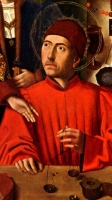
Alar, Elaere, Elar, Elard, Eler, Eloi, Eloy, Iler, Loy
• 24 June (translation of relics, and blessing of horses)
• 8 November as one of the Saints of the Diocese of Evry
Son of Eucherius and Terrigia. Extremely skillful metalsmith. Apprenticed to the master of the mint at Limoges, France. Treasurer at Marseilles, France. Master of the mint under King Clotaire II in Paris, France; a close friend of and advisor to Clotaire. Noted for his piety, hard work and honesty, Eligius was generous to the poor, ransomed slaves (including Saint Tillo of Solignac), built churches, a monastery at Solignac, France, and a major convent in Paris. It was said that you could easily find his house by the number of poor people there that he was caring for. Counselor to and diplomat for King Dagobert I. Friend of Saint Ouen of Rouen with whom he formed a small religious society. Persuaded Breton King Judicael to accept the authority of Dagobert.
Ordained in 640. Bishop of Noyon, France and Tournai, Belgium in 641. Built the basilica of Saint Paul. Preacher in Antwerp, Ghent, and Courtai in Belgium, with many converts, generally brought to the faith by his example of charity and work with the poor and sick. Friend and spiritual teacher of Saint Godeberta. Encouraged devotion to the saints and reverence for their relics; he discovered the relics of Saint Quentin, Saint Piaton, and Saint Lucian of Beauvais, and made many reliquaries himself. Miracle worker with the gifts of clairvoyance and prophecy; he foresaw the date of his own death.
He has become the traditional patron of all smiths, metal workers, and craftsmen. His patronage of horses and the people who work with them stems first from his patronage of smiths and craftmen, but also from his having left a horse to a priest at his death. The new bishop liked the horse, and took it from the priest. The horse became sick, but recovered immediately when it was returned to the priest that Eligius had chosen. There is also a legend of Eligius removing a horse's leg in order to easy shoe it, then putting the leg back in place. In some places horses are blessed on his feast day. Through the years, horse-drawn cabs were replaced by motorized ones, and stables were supplanted by garages and gas stations, but the patronage of the people who do those jobs and work in those places has remained.
588 at Catelat, near Limoges, France
• 1 December 660 at Noyon, France of high fever
• interred in the cathedral of Noyon
• against boils • against epidemics • against equine diseases • against poverty • against ulcers • agricultural workers, farm workers, farmers • basket makers • blacksmiths • boilermakers • cab drivers, cabmen • carpenters • carriage makers • cart makers, cartwrights • carters • clock makers • coachmen • coachwrights • computer scientists • craftsmen • cutlers, cutlery makers • electricians • engravers • farriers • garage workers • gas station workers • gilders • gold workers • goldsmiths • guards • gunsmiths • harness makers • horse traders • horseshoe makers • jewelers • jockeys • knife makers • laborers • lamp makers • locksmiths • mechanics • metal workers, metalsmiths • miners • minters, minting • numismatics • REME • Royal Electrical and Mechanical Engineers • saddle makers • saddlers • scissors grinders • security guards • servants • silversmiths • taxi drivers • tinsmiths • tool makers • veterinarians • watch makers • wheelwrights • coin collectors • garages • gas stations • horses • livestock • metal collectors • numismatists • peasants • petrol stations • precious metal collectors • sick horses • 3 cities •
• anvil
• bishop with a crosier in his right hand, on the open palm of his left a miniature church of chased gold
• bishop with a hammer, anvil, and horseshoe
• bishop with a horse
• courtier
• goldsmith
• hammer
• horseshoe
• man grasping a devil's nose with pincers
• man holding a chalice and goldsmith's hammer
• man holding a horse's leg, which he detached from the horse in order to shoe it more easily
• man shoeing a horse
• man with hammer and crown near a smithy
• man with hammer, anvil, and Saint Anthony
• pincers
• man with Saint Godebertha of Noyon
• man giving a ring to Saint Godebertha
• man working as a goldsmith
https://catholicsaints.info/saint-eligius/
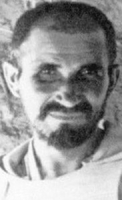
• Brother Charles of Jesus
• Brother Marie-Alberic
Born to an aristocratic family; orphaned by age six, he and his sister Mary were raised by their grandfather. Studied at Jesuit schools in Nancy and Paris, France from 1872 to 1875. Entered the Saint-Cyr Military Academy in 1876. Joined the 4th Hussar regiment; in 1880 his unit was sent to Setif, Algeria. He was discharged from the service in March 1881 for misconduct, and moved to Evian, France. During the Revolt of Bon Mama in South Oran two months later, Charles re-enlisted, and fought for the eight months of the rebellion. He became so fascinated with the Arabs that he met that when he could not obtain a leave of absence to study them, he resigned his commission.
He spent 15 months learning Arabic and Hebrew, and then travelled into Morocco. In May 1885 he received the Gold Medal of the French Geographic Society for his work. He explored Algeria and Tunisia from September 1885 through January 1886, returning to Paris in February to work on his book Reconnaissance au Maroc, which was published in 1888. He lived very simply, sleeping on the floor, spending hours each day in prayer at home and in church. Pilgrim to the Holy Lands from November 1888 to February 1889, and spent much of the rest of 1889 in spiritual retreats.
On 16 January 1890 he joined the Trappist monks at the monastery of Notre Dames-des-Neiges, taking the name Brother Marie-Alberic; he moved to the monastery of Akbes, Syria in June. Sent to study in Rome in October 1896, but after three months it became obvious that his heart, head and spirit were elsewhere, and he was released from his vows.
He made multiple pilgrimages through the Holy Lands on foot before returning to France to study for the priesthood. Ordained on 9 June 1901 at Viviers. He moved to the Oran region near Morocco in late 1901 to establish a base and found an order to evangelize Morocco. In 1902 he began a program of buying slaves in order to free them. In 1904 he began evangelizing nomadic Tauregs in the area of south and central Sahara. Translated the Gospels into the language of the Tauregs. In November 1908 he translated Tauareg poetry to French, and he spent years compiling a Taureg lexicon. In March 1909 he succeeded in founding the Union of Brothers and Sisters of the Sacred Heart to evangelize the French colonies in Africa. Killed when caught in the middle of combat between French forces and Arab insurrectionists.
15 September 1858 in Strasbourg, France as Charles Eugenie de Foucauld
shot on 1 December 1916 at Tamanrasset, Algeria
• 13 November 2005 by Pope Benedict XVI
• recognition celebrated by Cardinal Saraiva Martins at Saint Peter's Basilica, Rome, Italy
• 15 May 2022 by Pope Francises
• the canonization miracle involved the healing of a young man from the injuries sustained in a 50 foot fall; the healing occurred on 30 November 2016 in Saumur, France at the end of a novena prayed in preparation for the centenary of the death of Blessed Charles
Father, I abandon myself into Your hands; do with me what You will. Whatever You do I thank You. I am ready for all, I accept all. Let only Your will be done in me, as in all Your creatures, I ask no more than this, my Lord. Into Your hands I commend my soul; I offer it to You, O Lord, with all the love of my heart, for I love You, my God, and so need to give myself - to surrender myself into Your hands, without reserve and with total confidence, for You are my Father. - Blessed Charles's Prayer of Abandonment
As soon as I believed there was a God, I understood I could do nothing else but live for him, my religious vocation dates from the same moment as my faith: God is so great. There is such a difference between God and everything that is not. - Blessed Charles
I wish to be buried in the place where I die and to remain there until the Resurrection. I forbid that my body be transported elsewhere, that I be taken from the spot where the Good Lord has had me finish my pilgrimage. - from the will of Blessed Charles
https://catholicsaints.info/saint-charles-de-foucauld/
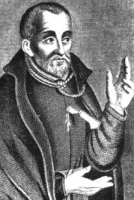
• Edmundus Campion
• The Pope's Champion
• 25 October as one of the Forty Martyrs of England and Wales
• 29 October as one of the Martyrs of Douai
• 1 December as one of the Martyrs of Oxford University
Son of a Catholic bookseller named Edmund whose family converted to Anglicanism. The boy planned to enter his father's trade, but earned a scholarship to Saint John's College, Oxford under the patronage of Queen Elizabeth I's court favorite, Robert Dudley, Earl of Leicester. Sought after speaker. Queen Elizabeth offered him a deaconate in the Church of England. He declined the offer, fled to the continent, and joined the Jesuits. Ordained in 1578.
He spent some time working in Bohemia, then returned to London,England as part of a Jesuit mission, crossing the Channel disguised as a jewel merchant. Edmund worked with Jesuit brother Saint Nicholas Owen. In London he wrote a description of his new mission in which he explained his work was religious, not political; it became known as Campion's Brag. Widely distributed, it encouraged many Catholics to remain loyal to their faith. It also led to Edmund's arrest, imprisonment and torture in the Tower of London, and martyrdom.
24 January 1540 at London, England
• hanged, drawn, and quartered on 1 December 1581 at Tyburn, London, England
• parts of his body were displayed at each of the four city gates as a warning to other Catholics
• relics at Rome, Prague, London, Oxford, Stonyhurst, and Roehampton
May 1970 by Pope Paul VI
And touching our Society, be it known to you that we have made a league - all the Jesuits in the world - cheerfully to carry the cross you shall lay upon us, and never to despair your recovery, while we have a man left to enjoy your Tyburn, or to be racked with your torments or consumed with your prisons. The expense is reckoned, the enterprise is begun; it is of God, it cannot be withstood. So the faith was planted; so it must be restored. - Saint Edmund Campion, from Campion's Brag
As to the treasons which have been laid to my charge, and for which I come here to suffer, I desire you all to bear witness with me that I am thereto altogether innocent. I am a Catholic man and a priest; in that Faith I have lived, and in that Faith do I intend to die. If you esteem my Religion treason, then I am guilty; as for the other treason, I never committed any, God is my judge. - Saint Edmund Campion
https://catholicsaints.info/saint-edmund-campion/
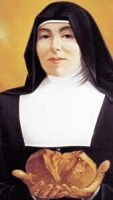
• Ecumenical Flame
• Elisa Angela Meneguzzi
• Sister Gudda (Ethiopian nickname)
• Sister Great (meaning of Gudda)
• Sister Liduina
Born to a poor farm family. Noted as a child for her piety, attending daily Mass, praying often, teaching catechism as soon as she was old enough, and considering the religious life. At age 14 she began working as a servant to local wealthy families, and in the hotels around the hot springs of Abano. On 5 March 1926 she answered the call to religious life and joined the Sisters of the Congregation of Saint Francis de Sales.
She worked for years at the Santa Croce boarding school as housekeeper, sacristan, nurse and big sister to the girls. In 1937 she was finally allowed to enter the mission fields, working at Dire-Dawa, Ethiopia, a cosmopolitan, crossroads city with people of many backgrounds, races and religions including Catholics, Copts, Muslims and native pagans. Liduina worked as a nurse in the Parini Civil Hospital first with civilian patients, and after the outbreak of World War II, with injured soldiers. When the city was bombed she worked in the streets, carrying the wounded to shelter, baptizing dying children, leading dying Christians through acts of contrition.
Her work with the Ethiopians, black and white, Christian, Muslim and neither, gave her the chance to speak to them all about the faith. She would tell any who would listen about the goodness of God the Father; her example led many to ask, and her ecumenism anticipated the later work of Vatican II.
12 September 1901 in Abano Terme, Padua, Italy as Elisa Angela Meneguzzi
• 2 December 1941 of cancer in Dire-Dawa, Ethiopia
• at the insistence of the injured soldiers who loved her, she was buried in the military graveyard at Dire-Dawa
• relics translated to the motherhouse of the Sisters of the Congregation of Saint Francis de Sales in Padua, Italy in July 1961
20 October 2002 by Pope John Paul II
The message that the Blessed Liduina Meneguzzi nowadays brings to the Church and to the world is that of hope and love. A kind of hope which redeems men both from their selfishness and from aberrant forms of violence. A kind of love which is an urge to solidarity, to sharing out and to service, following the example of Christ who came not to be served, but to serve and to give his life to save all of us. - from the Decree on the Heroicness of the Virtues of Blessed Liduina by the Congregation for the Causes of Saints
I've never seen someone dying with such joy and bliss. - the doctor who attended Liduina at the end
https://catholicsaints.info/blessed-liduina-meneguzzi/
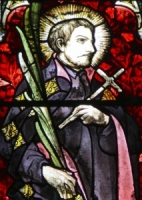
• 25 October as one of the Forty Martyrs of England and Wales
• 29 October as one of the Martyrs of Douai
• 1 December as one of the Martyrs of Oxford University
Born to a yoeman family, described as a handsome young man, and raised Protestant. Studied in Oxford. Convert to Catholicism. Studied at the English College at Rheims, France. Ordained on 29 March 1578.
Returned to Somersetshire, England as a missioner in August 1579. Arrested on 28 April 1581 in London at the home of Father Robert Persons. Tortured in the Tower of London, partially for information on Father Robert's location. During this misery, he wrote to the Jesuits, asking for admission; they accepted him sometime in his last weeks in prison.
Condemned to death with six other priests on 16 November 1581 at Westminster for the treason of priesthood. Martyred with Saint Ralph Sherwin and Saint Edmund Campion in the persecutions of Queen Elizabeth I. One of the Forty Martyrs of England and Wales.
In prison, Alexander made himself a small wooden cross, and gripped it tightly all the times, even during trial. In the courtroom it was wrestled away from him. He told the judge, "You can take it out of my hands, but not out of my heart." The cross was later bought by Catholics, and is at the English College at Rome.
1556 at Somersetshire, England
hanged, drawn, and quartered on 1 December 1581 at Tyburn, England
25 October 1970 by Pope Paul VI
https://catholicsaints.info/saint-alexander-briant/
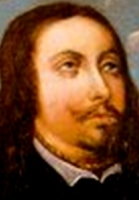
• 25 October as one of the Forty Martyrs of England and Wales
• 29 October as one of the Martyrs of Douai
• 1 December as one of the Martyrs of Oxford University
A fellow and noted classical scholar at Exeter College, Oxford, England; he received his Master of Arts degree on 2 July 1574. Convert to Catholicism in 1575. Studied for the priesthood at the English College, Douai, France; ordained on 23 March 1577. He then studied at the English College, Rome, Italy where he became a leader of the English students. Returned to England on 1 August 1580 to minister to covert Catholics. On 9 November 1580 he was arrested in London for the crime of priesthood, and imprisoned in Marshalsea prison; he ministered to fellow prisoners, and converted many of them. In December 1580 he was transferred to the Tower of London where he was tortured on the rack and thrown out into the snow to recover. Queen Elizabeth offered to make him a bishop if he would renounce the Catholic Church; he refused. Convicted with several other priests on 20 November 1581 of treason for promoting Catholicism. Proto-martyr of the English College, Rome.
c.1550 at Rodsley, Derbyshire, England
hanged, drawn, and quartered on 1 December 1581 at Tyburn, London, England
25 October 1970 by Pope Paul VI
Jesu, Jesu, Jesu, esto mihi Jesus! - Saint Ralph's last words
https://catholicsaints.info/saint-ralph-sherwin/
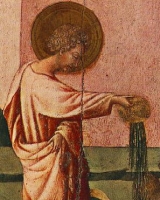
• Ansanus of Siena
• Apostle of Siena
• Amsanus, Ampsanus, Anisanus, Ansano, Sano
Born into the imperial Roman nobility, the son of a pagan senator. Christian convert at age twelve. His father denounced him to the authorities. The boy escaped, and converted so many pagans in Bagnorea and Siena, Italy that he gained the title the Baptizer. Martyred in the persecutions of Diocletian.
• beheaded in 304 on the road outside Siena, Italy
• church built over the site of the execution
• relics transferred to the cathedral of Siena, Italy in 1107
Siena, Italy
• baptizing
• beheaded
• boiled in oil
• cross
• dates
• heart with the letters IHS on it
• palm with dates
• towers in the background
• man holding towers in his hand
• richly-dressed young man
• with a palm and banner
• young man holding a heart and liver
• young man holding a liver
• young man holding a cluster of dates
https://catholicsaints.info/saint-ansanus-the-baptizer/
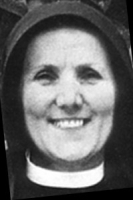
Sister Maria Rosa of Jesus
Youngest of nine children. When her two sisters-in-law died, the teenaged Bruna helped raised their six small children. On 27 August 1940 she joined the Franciscan Missionary Sisters of Christ (formerly Franciscan Sisters of Sant'Onofrio), taking the name Maria Rosa of Jesus. Taught elementary school in Sassuolo, Italy from 1942 to 1945. Known for working endlessly as a way to suppress her ego. Taught for a few months at the parish school in Ferrara, Italy in 1945, but contracted tuberculosis and was hospitalized, transferred to a series of sanitoriums, and finally confined for the rest of her days where she fought the disease and helped her sisters with their spiritual development. Made three pilgrimages to Lourdes.
11 November 1917 in Morano di Prignano sulla Secchia, Modena, Italy as Bruna Pellesi
1 December 1972 in Sassuolo, Reggio Emilia, Italy of complications from tuberculosis
29 April 2007 by Pope Benedict XVI
In recompense, my heart sings and I am very happy. - Blessed Bruna discussing her health problems
https://catholicsaints.info/blessed-bruna-pellesi/

Sister Marie Clementine
Born to a non-Christian family, the daughter of Nengapeta. With her mother and sisters, she converted to Christianity, taking the name Alfonsina. Nun, a member of the Nivelles, Belgium based Congregation of the Holy Family, making her first profession on 5 August 1959. Served as a sacristan and cook at her house, and a elementary school teacher. Captured during the civil war in the Congo, she was murdered by her captors when they tried to rape her and she responded by fighting them off while praying. Martyr.
1941 in Wamba, Orientale, Democratic Republic of Congo
beaten to death on 1 December 1964 in Isiro, Orientale, Democratic Republic of Congo
15 August 1985 by Pope John Paul II
I forgive you, because you do not know what you do. – dying words of Blessed Alphonsine
https://catholicsaints.info/blessed-alphonsine-anuarite-nengapeta/

Thomas Marshall
Benedictine monk. Doctor of Divinity from Oxford in 1515. Abbot of Saint Werburgh abbey, Chester, England. Abbot of Saint John's abbey, Colchester, England on 10 June 1530. Friend of Saint John Fisher and Saint John More. Initially opposed King Henry VIII's presumption of supremacy in spiritual matters, but he and sixteen of his monks took take the Oath of Supremacy on 7 July 1534. When his abbey was dissolved in November 1538, he denied the king's right to do so, and refused to surrender the keys. For his belated defense of the abbey, he was charged with treason, and lodged in the Tower of London. Released and re-arrested, he was tried by a special commission in Colchester in November 1539. He stood by the supremacy of the Church in matters spiritual, and the right of the Church to manage its own affairs. Martyr. Venerated in the dioceses of Westminster and Brentwood, and by the English Benedictines.
English
hanged, drawn, and quartered on 1 December 1539 at Colchester, England
13 May 1895 by Pope Leo XIII (cultus confirmed)
https://catholicsaints.info/blessed-john-beche/
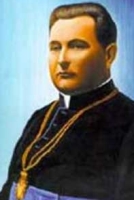
12 June as one of the 108 Martyrs of World War II
Priest in the diocese of Radom, Poland, serving in the Konskie parish. Imprisoned, tortured, sent to the Auschwitz forced labour camp, and eventually executed during the Nazi persecutions of World War II for refusing to stop preaching Christianity.
29 December 1882 in Konskie, Swietokrzyskie, Poland
shot on 11 December 1942 in Oswiecim (Auschwitz), Malopolskie, Nazi-occupied Poland
13 June 1999 by Pope John Paul II
I cannot leave my parishioners. I will be with them even if I am in danger of death. - Blessed Kazimierz when he learned that he might be arrested by the Gestapo
If God demands from me such a sacrifice for the good of the Church and homeland, I am willing to make it. - Blessed Kazimierz to a friend as he was being arrested by the Gestapo
https://catholicsaints.info/blessed-kazimierz-tomasz-sykulski/
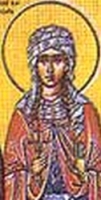
Christian woman married to a non-Christian Nicomedian imperial officer named Adrian. Her husband was so impressed by Christians persecuted by Diocletian that he openly declared he was a Christian, though he hadn't even been baptized; he was immediately arrested. Natalia visited him, arranged for his instruction in the faith, and ministered to other prisoners. When Adrian was sentenced to death and could have no visitors, Natalia disguised herself as a boy and bribed her way in to see him. On 8 September 304 she watched Adrian's tortured execution, and had to be restrained from throwing herself on the funeral pyre. When a storm put out the fire, she managed to recover Adrian's hand, which she kept as a relic. She then moved to Argyropolis where she lived out the rest of her days alone.
3rd century
1 December 311 at Argyropolis of natural causes
woman holding her husband's severed hand
https://catholicsaints.info/saint-natalia-of-nicomedia/
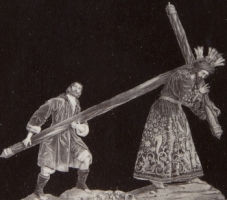
Simon the Cyrenian
First century convert. Father of Saint Rufus. Helped Christ carry the cross on the way to Calvary. Missionary to France. First bishop of Avignon, France. Martyr.
crucified c.100
carrying a cross
As they were going out, they met a Cyrenian named Simon; this man they pressed into service to carry his cross. - Matthew 27:32
They pressed into service a passer-by, Simon, a Cyrenian, who was coming in from the country, the father of Alexander and Rufus, to carry his cross. - Mark 15:21
As they led him away they took hold of a certain Simon, a Cyrenian, who was coming in from the country; and after laying the cross on him, they made him carry it behind Jesus. - Luke 23:26
https://catholicsaints.info/saint-simon-of-cyrene/
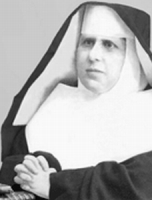
• Libânia Do Carmo Galvão Mexia de Moura Telles de Albuquerque
• Maria Clara do Menino Jesus
• Mother Clara
Joined the Capuchin Tertiaries of Our Lady of the Conception in 1869, taking the name Sister Maria Clara of the Child Jesus. Founded the Congregation of the Franciscan Hospitallers of the Immaculate Conception; they were approved by the Vatican on 27 March 1876.
15 June 1843 in Amadora, Lisbon, Portugal
• 1 December 1899 in Lisbon, Portugal of natural causes
• interred at the General House of the Franciscan Hospitallers, Linda-a-Pastora, near Lisbon
21 May 2011 by Pope Benedict XVI
https://catholicsaints.info/blessed-maria-clara-of-the-child-jesus/
Aguy, Airy, Algeric
Born to a poor farm family. Parish priest at Saint Peter and Paul Church, Verdun, France. Bishop of Verdun in 554. Advisor to King Childebert II. Noted for his generosity to the poor. Reputed miracle worker in his later years.
Once a local rebel leader named Bertifroi sought sanctuary in the chapel of bishop Agericus in Verdun. Though a member of the royal court himself, Agericus defended the rebel's right to sanctuary in a house of God. The king's men, however, ignored the tradition and the bishop, broke into the chapel, and killed Bertefroi.
• c.521 at Verdun, France in a field where his mother was working the crops
• she gave him the name Agericus because of his agricultural beginning
588 in Verdun, France of natural causes
https://catholicsaints.info/saint-agericus-of-verdun/

Olympias
Pagan imperial Roman consul and magistrate who conducted the trial against Saint Firmina of Amelia for her faith. Her beauty, her strength and her resolve caused him to fall for her, but when he tried to force himself on her physically, he became paralyzed until she prayed over him. This demonstration of the power of her faith caused him to convert to Christianity. Martyred by order of his magisterial replacement, Megezio, in the persecutions of Diocletian.
• tortured to death in 303 at Amelia, Umbria, Italy
• buried on the estate of Agoliano on 1 December 303
https://catholicsaints.info/saint-olympiades/
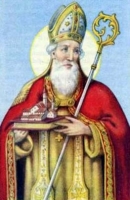
12 November in Casale Monferrato, Italy (translation of relics)
First bishop of Asti in the Piedmont of Italy. Opponent of Arianism, which led to his martyrdom under Julian the Apostate. There are serveral accounts of his life, but none are reliable.
Benevento, Italy
c.362 at Casale Monferrato, Italy
• Bizzarone, Italy
• Casale Monferrato, Italy
• Pedrengo, Italy
• Rocchetta Palafea, Italy
• crozier
• mitre
https://catholicsaints.info/saint-evasius-of-asti/
Diodorus
In 283 an entire congregation was martyred in the persecutions of Numerian when they assembled in the catacombs for prayers - and were walled in to suffocate or starve. The only names that have come down to us are Saint Didorus and Saint Marianus.
Roman citizen
283 in the catacombs in Rome, Italy
https://catholicsaints.info/saint-didorus/
Member of the English gentry and lifelong layman. Condemned for travelling with Blessed Robert Morton, and for paying sixpence for Robert's supper. Martyr.
Ousethorpe, Yorkshire, England
hanged on 1 December 1586 at York, England
15 December 1929 by Pope Pius XI
https://catholicsaints.info/blessed-richard-langley/

Castritien
Bishop of Milan, Italy for 42 years. Noted for establishing care for the poor and travellers, and for restoring the diocese following years of persecution.
137
https://catholicsaints.info/saint-castritian-of-milan/
Domnole
Monk. Abbot of Saint-Laurent Abbey in Paris, France. Bishop of Cenómano, Neustria (modern Le Mans, France) in 543. Founded a number of monasteries, churches and hospitals in his diocese. Miracle worker.
581 in Le Mans, France of natural causes
https://catholicsaints.info/saint-domnolus-of-le-mans/
In 283 an entire congregation was martyred in the persecutions of Numerian when they assembled in the catacombs for prayers - and were walled in to suffocate or starve. The only names that have come down to us are Saint Marianus and Saint Didorus.
Roman citizen
283 in the catacombs in Rome, Italy
https://catholicsaints.info/saint-marianus/
Constantian of Javron
Monk at the Saint-Mesmin de Micy Abbey, France. Hermit at Jaron, Maine, France. Founded and served as first abbot of Javron Abbey.
in Auvergne, France
570 of natural causes
https://catholicsaints.info/saint-constantine-of-javron/
Franciscan Friar Minor. Noted preacher in Italy. Missionary to the Holy Land.
1400 at Ferrara, Italy
1482 at Cotignola, diocese of Faenza, Italy of natural causes
1901 by Pope Leo XIII (cultus confirmed)
https://catholicsaints.info/blessed-antony-bonfadini/
Bishop of Fréjus, Provence, France, c.419 until his death. Supported the abbey at Lérins, France. Friend of Saint John Cassian who dedicated many of his writings to Leontius.
c.432 in Fréjus, Provence (in modern France)
https://catholicsaints.info/saint-leontius-of-frejus/
Renato, Renatus
Son of Resignatus of Koblenz, a knight and Aielis. Bishop of Maastricht, Netherlands in 437, serving for 28 years.
Netherlands
465 of natural causes
https://catholicsaints.info/saint-resignatus-of-maastricht/
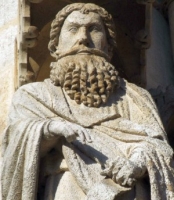
Old Testament minor prophet. His short prophecy is directed against Niniveh, whose destruction he warned of and saw.
northern Palestine
c.660 BC
https://catholicsaints.info/nahum-the-prophet/
Convert, brought to the faith by Saint Hilary of Poitiers while he was in exile. She then went with him back to Poitiers, France and became a nun.
c.365 in Poitiers, France of natural causes
https://catholicsaints.info/saint-florence-of-poitiers/
Bishop of Brescia, Lombardy, Italy. Participated in the Council of Sardica in 347.
• 347 at Brescia, Italy
• his shrine still exists
https://catholicsaints.info/saint-ursicinus-of-brescia/
One of the first spiritual students of Saint Dominic de Guzman. Helped found the friary at Perugia, Italy.
https://catholicsaints.info/blessed-christian-of-perugia/
With Saint Declan, he was an eighth century evangelist to the Germanic people who had been brought the faith by Saint Boniface of Crediton.
https://catholicsaints.info/saint-martinus/
Fifth century regional bishop. Evangelized the territory of Maastricht, Netherlands.
https://catholicsaints.info/saint-candres-of-maastricht/
Eighth century evangelist to the Germanic people who had been brought the faith by Saint Boniface of Crediton. Worked with Saint Martinus.
https://catholicsaints.info/saint-declan/
Bishop of Narni, Italy. Executed by order of the Gothic King Totila.
c.542
https://catholicsaints.info/saint-proculus-of-narni/
Nofleta
Seventh century nun. Friend of Saint Longis.
French
https://catholicsaints.info/saint-agnofleta/
Philatus
Martyr.
Rome, Italy
https://catholicsaints.info/saint-filatus-of-rome/
Sixth century holy man at Amboise, Touraine, France. Friend of Saint Germain in Paris, France.
https://catholicsaints.info/saint-florentius/
Roman martyr.
https://catholicsaints.info/saint-cassian-of-rome-1-december/
Martyr.
Rome, Italy
https://catholicsaints.info/saint-superatus-of-rome/
Martyr.
Rome, Italy
https://catholicsaints.info/saint-lucius-1-december/
Martyr.
Rome, Italy
https://catholicsaints.info/saint-jabinus-of-rome/
Martyr.
Rome, Italy
https://catholicsaints.info/saint-latinus-of-rome/
Martyr.
Rome, Italy
https://catholicsaints.info/saint-rogatus-of-rome/
Namesake for Llanrwst, Clwyd, Wales.
seventh century Wales
https://catholicsaints.info/saint-grwst/
Martyr.
Rome, Italy
https://catholicsaints.info/saint-marina-of-rome/
Martyr.
Rome, Italy
https://catholicsaints.info/saint-ambon-of-rome/
Layman. Martyr.
https://catholicsaints.info/saint-ananias-of-arbela/
Martyr.
Rome, Italy
https://catholicsaints.info/saint-candida/
A joint commemoration of all the men who studied at one of the colleges of Oxford University, and who were later martyred for their loyalty to the Catholic Church during the official persecutions in the Protestant Reformation. They are
• Blessed Edward James • Blessed Edward Powell • Blessed Edward Stransham • Blessed George Napper • Blessed George Nichols • Blessed Hugh More • Blessed Humphrey Pritchard • Blessed James Bell • Blessed James Fenn • Blessed John Bodey • Blessed John Cornelius • Blessed John Forest • Blessed John Ingram • Blessed John Mason • Blessed John Munden • Blessed John Shert • Blessed John Slade • Blessed John Storey • Blessed Lawrence Richardson • Blessed Mark Barkworth • Blessed Richard Bere • Blessed Richard Rolle de Hampole • Blessed Richard Sergeant • Blessed Richard Thirkeld • Blessed Richard Yaxley • Blessed Robert Anderton • Blessed Robert Nutter • Blessed Robert Widmerpool • Blessed Stephen Rowsham • Blessed Thomas Belson • Blessed Thomas Cottam • Blessed Thomas Pilcher • Blessed Thomas Plumtree • Blessed Thomas Reynolds • Blessed William Filby • Blessed William Hart • Blessed William Hartley • Saint Alexander Briant • Saint Cuthbert Mayne • Saint Edmund Campion • Saint John Boste • Saint John of Bridlington • Saint John Roberts • Saint Ralph Sherwin • Saint Thomas Garnet • Saint Thomas More •
https://catholicsaints.info/martyrs-of-oxford-university/
• Anthony the Younger
• Arnold of Cologne
• Blanche of Castile
• Giovanni Gueruli da Verucchio
• Girolamo de Pratis
CatholicSaints.Info Portable Edition